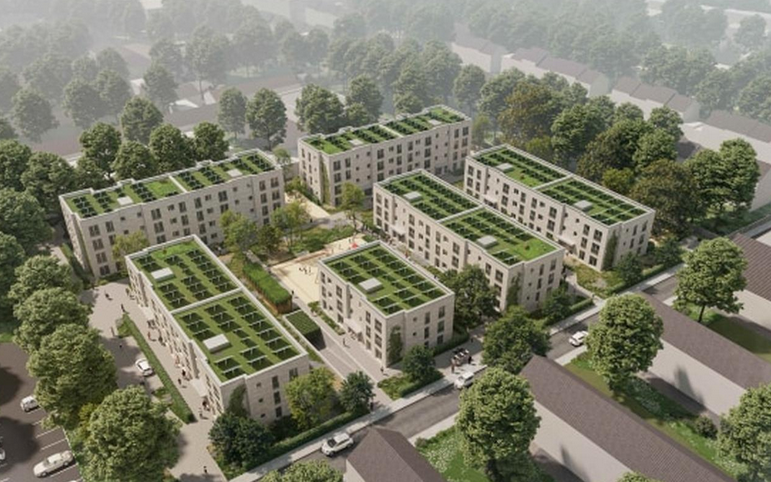
Elderly People Evicted to Make Way for Migrants in Germany
Older citizens are losing their homes so migrants can move in. Cases where operators pocket hefty profits while pensioners are left homeless are becoming increasingly common in Germany,
In Bargteheide, Schleswig-Holstein, elderly residents were forced to leave their homes under the pretext that the building was to be demolished. No demolition took place. Instead, the building is being renovated — but not so its original occupants can return. Instead of the elederly, refugees are now moving in.
This is a classic case of the so‑called “demolition trick”: eviction is ordered under false pretences, then the flats are handed over to migrants.
Berlin‑Köpenick: from senior residence to refugee housing
Another example comes from Köpenick in Berlin. There, a building that had housed the elderly until 2013 was converted into shelter for refugees. After being used until summer 2017, it was demolished, and a modular refugee accommodation was built on the cleared site. What was once a care home for senior citizens is now a migrant shelter.
In 2023, the “Wohnen & Pflege Schillerpark” retirement home in Berlin‑Wedding came under private management in 2006. Designed for 141 residents, its lease originally ran for 25 years with an extension option. But by 2021—ten years before the lease expired—the operator suddenly announced it would repurpose the building for its own use. This plunged the facility’s future into uncertainty. Originally part of a broader care complex with an outpatient centre and another retirement home, the building is now being used to house refugees—an economically more viable option given state migration subsidies compared to elderly care.
Two years ago in Baden‑Baden, 20 empty flats in a Lichtental retirement home were rented to house asylum‑seekers. Initially, this was unproblematic, since the flats were vacant.
However, when the town attempted to rent additional flats still occupied by elderly tenants, a scandal erupted: some landlords launched eviction proceedings aimed at hastening the removal of pensioners in pursuit of more lucrative tenants.
In response, the Baden‑Baden homeowners’ association (WEG) withdrew pending eviction claims against pensioners and instead offered them new leases. Nonetheless, conflict with the former care‑home operator persisted, as they refused to hand over flats back to the WEG.
Alte Menschen verlieren ihre Heimplätze, damit Migranten einziehen können – dieser Skandal aus Deutschland macht jetzt auch in Österreich Schlagzeilen. Immer öfter wird abgerissen, „renoviert“ – und plötzlich wohnen statt Senioren Flüchtlinge dort. Wer p… https://t.co/GRoGm2K5Mo
— exxpress (@exxpressat) June 17, 2025
An earlier case from 2013 in Berlin’s Reinickendorf district received nationwide attention. The Marie‑Schlei‑Haus, originally a retirement home, was earmarked for conversion into refugee housing. Following public protest, local politicians reversed course and abandoned the plan. As Junge Freiheit reported at the time, this demonstrates that political decisions are not inevitable.
Germany sees a gworing number of similar cases across the country
- In Norderstedt, the former “Haus Rosengarten” will become refugee accommodation two years after its closure
- In Meissen, an annex of a partially occupied senior residence has been converted for under‑age refugees
- In St Georg, Hamburg, a former care home is now housing needy refugees
- In Stuttgart‑Schönberg, a previous nursing home has been handed over to accommodate around 100 migrants
- In Leonberg (Baden‑Württemberg), an old people’s home was vacated and offered to the district for refugee use despite local opposition
The main motif is money: the elderly are squeezed out for economic gain
Each case shares a simple economic logic: refugee accommodation often yields higher returns for operators than elderly care. The strict regulations, low margins, and high staffing costs of senior homes contrast with flat-rate state migration subsidies that can yield profit margins of up to 50 percent.
Municipalities frequently pay far more for refugee housing than pensioners can afford in rent.
The so‑called “demolition trick” quietly pushes out seniors from homes for financial gain—but the social consequences are costly, as noted by Nius.de.
Housing refugees is big business
At least 130 refugee shelters in Germany are operated entirely or partly by private companies and are highly profitable.
One example is Serco, a British firm active worldwide in defence, border control, prisons, space, and migration services under government contracts in Europe, the UK, and Australia.
In recent years Serco’s subsidiaries – ORS and European Homecare – have won a growing number of tenders in Germany’s immigration sector. According to a survey, the subsidiaries now run around 130 refugee centres in Germany, hosting approximately 55 000 refugees.
Serco has pursued similar contracts in the UK with a ten‑year deal worth around £1.9 billion (approx. €2.2 billion), valid until 2029. Since 2014 it has also operated immigration centres in Australia under agreements worth about AUD 4 billion (€2.4 billion) over ten years.
Private companies operate migrant shelters in 13 German states
Currently, thirteen German states have commissioned private firms to accommodate refugees — a practice spreading across both Germany, and Europe. Previously, these contracts were awarded to public bodies, charities, or non‑governmental organisations.
“Profit margins in these homes are significantly higher than Serco’s targets across all sectors. They seem to have found a sector where real profits can be made,”
– Werner Nienhüser, an economist at Duisburg‑Essen University, told ARD’s Monitor programme,
In Rhineland‑Palatinate, a former US military barracks near Hahn airport has been turned into a 530‑bed facility that posted a gross margin of 66.8 percent last year.
The company also manages immigration centres in Italy, Spain, France, Belgium, Austria, and Switzerland.
Migrants are a tool to becoming rich
Internally, employees have reported that the firm is more concerned with profit than people, and the main objective is to strike it richfrom the refugee business.
“Refugees are not viewed as humans here, but as products and a means to enrich the company,”
– as one staff member put it.
Cover photo: In Hamburg‑Bahrenfeld, a soon-to-be completed 41-million-euro project is dedicated exclusively to migrant families.

